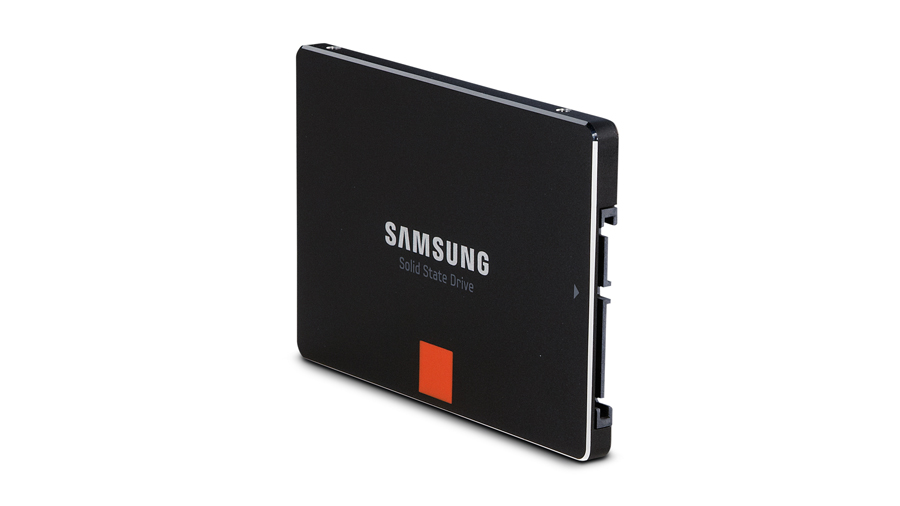TechRadar Verdict
Pros
- +
Fastest 512GB drive we have tested
- +
Good 4K random read figure
Cons
- -
Newer drives beat it on price
Why you can trust TechRadar
Whether it's components like memory chips, processors and LCD panels or retail clobber like phones and TVs, Samsung is assimilating everything.
In that context, two things are immediately apparent. The first is that you'd better not be in the bad books when the People's Republic of Samsung comes into force, as seems to be inevitable. The second is that it should really come as no surprise that Samsung makes damn fine SSDs, such as the 840 Pro we have turning up here in 512GB guise.
For starters, Samsung makes its own flash memory. It's the snazzy 21nm Toggle NAND sort, so it's basically about as speedy as it currently comes. Samsung also makes its own controller chipsets, and as far as anyone can tell, those are about as good as it gets too. For proof, look no further than our benchmark results.
Benchmarks
4K random read performance (incompressible)
AS SSD: Megabytes per second: Higher is better
A-Data XPG SX900 512GB: 23
Corsair Neutron GTX 240GB: 23
Crucial M500 480GB: 21
Intel 520 480GB: 24
OCZ Vertex 450 256GB: 19
Samsung 840 Pro 512GB: 26
Sandisk Extreme II 240GB: 23
Seagate 600 480GB: 22
Transcend SSD720 512GB: 20
Toshiba Q Series 256GB: 18
Zip file decompression
ZIP: Seconds: Quicker is better
A-Data XPG SX900 512GB: 23
Corsair Neutron GTX 240GB: 23
Crucial M500 480GB: 23
Intel 520 480GB: 24
OCZ Vertex 450 256GB: 23
Samsung 840 Pro 512GB: 24
Sandisk Extreme II 240GB: 23
Seagate 600 480GB: 23
Transcend SSD720 512GB: 24
Toshiba Q Series 256GB: 22
4K random write performance (incompressible)
AS SSD: Megabytes per second: Higher is better
A-Data XPG SX900 512GB: 18
Corsair Neutron GTX 240GB: 50
Crucial M500 480GB: 54
Intel 520 480GB: 19
OCZ Vertex 450 256GB: 54
Samsung 840 Pro 512GB: 51
Sandisk Extreme II 240GB: 54
Seagate 600 480GB: 44
Transcend SSD720 512GB: 18
Toshiba Q Series 256GB: 45
Sequential read performance (incompressible)
AS SSD: Megabytes per second: Higher is better
A-Data XPG SX900 512GB: 505
Corsair Neutron GTX 240GB: 503
Crucial M500 480GB: 492
Intel 520 480GB: 499
OCZ Vertex 450 256GB: 504
Samsung 840 Pro 512GB: 520
Sandisk Extreme II 240GB: 515
Seagate 600 480GB: 508
Transcend SSD720 512GB: 502
Toshiba Q Series 256GB: 514
Sequential read performance (compressible)
ATTO: Megabytes per second: Higher is better
A-Data XPG SX900 512GB: 551
Corsair Neutron GTX 240GB: 556
Crucial M500 480GB: 539
Intel 520 480GB: 545
OCZ Vertex 450 256GB: 551
Samsung 840 Pro 512GB: 561
Sandisk Extreme II 240GB: 555
Seagate 600 480GB: 554
Transcend SSD720 512GB: 538
Toshiba Q Series 256GB: 552
Sequential write performance (incompressible)
AS SSD: Megabytes per second: Higher is better
A-Data XPG SX900 512GB: 298
Corsair Neutron GTX 240GB: 470
Crucial M500 480GB: 414
Intel 520 480GB: 218
OCZ Vertex 450 256GB: 497
Samsung 840 Pro 512GB: 500
Sandisk Extreme II 240GB: 468
Seagate 600 480GB: 437
Transcend SSD720 512GB: 259
Toshiba Q Series 256GB: 469
Sequential write performance (compressible)
ATTO: Megabytes per second: Higher is better
A-Data XPG SX900 512GB: 519
Corsair Neutron GTX 240GB: 506
Crucial M500 480GB: 432
Intel 520 480GB: 475
OCZ Vertex 450 256GB: 534
Samsung 840 Pro 512GB: 535
Sandisk Extreme II 240GB: 518
Seagate 600 480GB: 473
Transcend SSD720 512GB: 465
Toshiba Q Series 256GB: 519
Fastest sequential reads and writes for both compressible and incompressible data? That'll be the Samsung 840 Pro. It serves up the fastest 4K random read access, too. But the OCZ Vertex 450, among others, beats it when it comes to 4K random writes.
Verdict
This is a very fine drive: not only is it one of the quickest around, it comes with the peace of mind that you're buying from a big outfit that is very unlikely to disappear.
If you do have a problem, the odds of being able to cash in your warranty are high. That it's also pretty reasonably priced for a premium drive just adds to the appeal.
Technology and cars. Increasingly the twain shall meet. Which is handy, because Jeremy (Twitter) is addicted to both. Long-time tech journalist, former editor of iCar magazine and incumbent car guru for T3 magazine, Jeremy reckons in-car technology is about to go thermonuclear. No, not exploding cars. That would be silly. And dangerous. But rather an explosive period of unprecedented innovation. Enjoy the ride.
